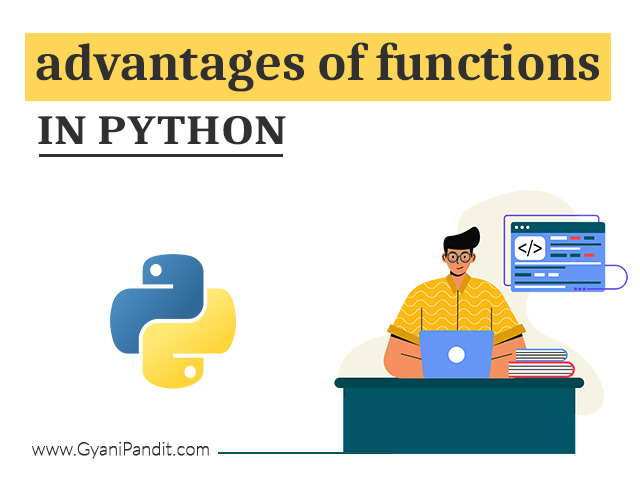Using functions in our Python programs can be useful at times, and actually, knowingly or unknowingly, we have been using many functions for doing different things, like taking input from the user or printing something on the screen, checking the type of the object, and many others.
So, when we are learning about functions and using them in our Python programs, it becomes important for us, to understand their advantages as well. Understanding this, we have come up with this easy-to-understand article, which would explain the advantages of functions in Python.
Advantages Of Functions in Python
So, let’s first answer a simple question, what is Function? Well, essentially, the function is just a block of code, which does some particular task, like there can be some function, which calculates the square of a given number, or some function that checks if the given number is even or odd, or there can be some function, for calculating the area of a circle. So, this tells us that the function is used to perform some particular task.
We have many built–in functions for doing different things in Python, and also, we can create our own functions. So here, now let’s turn to some of the advantages of functions in Python. Here is the list of some advantages, and we will then explore them one by one.
- Reducing duplication of code.
- Improved reusability of code
- Write Clearer Code
- Bigger problems are broken down into smaller problems.
Now, let’s explore the advantages one by one
Reducing the duplication of code
Let’s say that you do not know about functions in Python, and you need to check if the given number is palindrome or not in your program. Now, you may write the code required to check this, but let’s say that you again need to check for another number in the same program, so you will just copy and paste the code and be happy, but in this case, the program becomes lengthy, and there is duplicated code.
So, what if we could write the code only once, and then use it as many times as we want? Well, this is where functions come into the picture.
One of the ideas for using functions in our programs is that you would write them once in the program, and then use them as many times as you want. So, we do not need to write the same code every time. We just write it once, into the function, and then call the function as many times as you require. Just remember that every time you want to use the function, you need to call it.
Improved Reusability Of Code

As mentioned earlier, you just write the code once into the function, and then we can use that function as many times as required in the programs. So, this explains that we can simply reuse the code, without having to write it again.
This also keeps the code more readable, and easier to maintain (in case you want to make any changes, or you run into errors). So, whenever you are having some kind of repetitive task in the program, which requires the same code to be executed many times, you can go with creating some related function, and then call it as many times as required.
Write Clearer code
Just imagine that if you do not know about the functions in Python, you would write the code repetitively, and the program would then become lengthy and may be harder to understand (and also harder to maintain). But, when we are writing functions, our code looks clearer and more organized. If in case something goes wrong in the code, it also becomes easy to figure out what is wrong, and where.
Bigger problems are broken down into smaller problems.
When we are creating functions for doing different things, we can keep most of the things isolated. At times, we might require doing different things in our program, like if we were to create a calculator, we would have a bunch of different operations, like addition, subtraction, multiplication, division, and many other mathematical operations.
We can make a simple program calculator, in which there would be no function used. But instead, we can also break this bigger problem into smaller problems, like creating different functions for different operations.
This also helps in case something goes wrong in the program, since we have different functions, it becomes easier to figure out and fix the errors.
Summary
So, in this tutorial, we have discussed some of the advantages of using the functions in our Python programs. Reading the advantages, I hope that you have understood how important the concept of functions in Python, and many times, you would find it convenient to create functions for doing different stuff, so in your learning journey ahead, you would create, or you would go through a lot of functions (both built–in and user-defined).
If you find this tutorial helpful, you can consider going through other Python tutorials and exploring more about Python programming language. Also, you can explore much about Machine learning, Artificial intelligence, and other technological concepts.
FAQs related to the Advantages of functions in Python
Q: What are the different types of functions in Python?
1. Built-in Functions
2. User Defined functions
3. Lambda Functions


